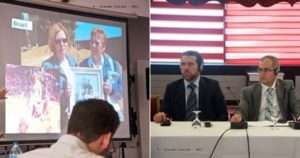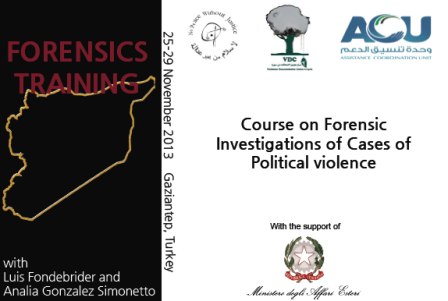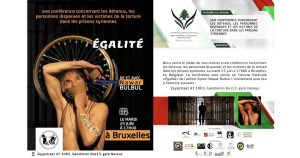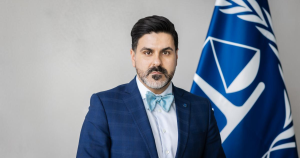On 25-29 November 2013, No Peace Without Justice (NPWJ), together with Assistance Cooperation Unit (ACU) and the Violations Documentation Centre in Syria (VDC), and with the support of the Italian Ministry of Foreign Affairs and the United Kingdom Foreign and Commonwealth Office, are holding a training course on “Forensic Investigations of Cases of Political violence”. The training is taking place in the city of Gaziantep, Southern Turkey, where a number of International NGOs and International Organisations have been based since the start of the crisis in Syria.
Participants include representatives from ACU, VDC, prosecutors from the Local Assistance Coordination Unit (LACU), an organization based in Gaziantep and tasked with providing development and governance oversight for local area councils inside Syria, lawyers and medical doctors and representatives of informal associations and NGOs working on investigation and documentation inside Syria, from Aleppo, Damascus and its surrounding country-side, Deirezzour and Idlib. NPWJ and the partner organisations were honoured to receive a contribution to the training from the newly-appointed Minister of Justice of the National Coalition for Syrian Revolutionary and Opposition Forces, Mr Fayez Al Daher, who stressed the importance of continuing such initiatives for the future of justice and accountability in Syria.

The presenters for the Training Course are experts in each of the specialised areas addressed by the course. Luis Fondebrider is an Argentine forensic anthropologist, co-founder and current president of the Argentine Forensic Anthropology Team (EAAF). He is also part of the Forensic International Team leading the drafting of the Manual on Genetics and Human Rights, under the leadership of the Government of Argentina. Analia Gonzalez Simonetto is Junior Investigator at EAAF and Assistant Professor of Biologic Anthropology, Paleoanthropology and Forensic Sciences at the University of Buenos Aires. Founded in Argentina in 1984, EAAF has worked in nearly 50 countries in the Americas, Africa, Europe and Asia and is one of the main referent forensic organizations for the United Nations and the Inter American Court of Human Rights.
The Forensic training course in Gaziantep aims to develop among participants a basic understanding of forensic evidence in criminal investigations, with an emphasis in cases of political violence, mainly human rights violations including enforced disappearances. It involves training on all relevant aspects of forensic investigations, including the recovery of ante-mortem data from relatives of the deceased; the survey and excavation of mass graves and the recovery of human remains; forensic archaeology and anthropology; forensic genetics; identification of human remains; analysis of trauma in bones; preparation of reports and the presentation of medical evidence; and cultural and religious issues in dealing with dead bodies and exhumations.
NPWJ’s Syria Project on Justice and Accountability
This five-day training course is part of an NPWJ project aimed at reducing the expectation and rewards of impunity and at building a culture of accountability. The purpose is to equip citizens to demand accountability and justice for violations taking place on a daily basis for the past two and a half years and, at the same time, to equip the judiciary and legal profession to answer that demand.
The mainstay of the project is a series of advocacy and training events, which are being held in Gaziantep, Turkey, near the Syrian border, with Syrian judges, lawyers and civil society activists from Syria who can bring the skills and (perhaps more importantly) aspirations for justice back to their work and their constituents inside Syria.
The long-term goal of this project is to promote democracy and human rights protection through incorporating justice and accountability in decision-making on conflict resolution and stability, development, and reconstructing planning in Syria. The project’s strategic objective is to support Syrian civil society playing an active role on justice and accountability issues, including advocacy and documenting human rights violations, including receiving, gathering, collecting, collating, processing and securely storing information, documentation and materials and analyse it for the purpose of establishing what happened and reconstructing decision-making processes that resulted in violations international humanitarian and human rights law in Syria since March 2011.
Documentation:
- Download the report on the training course on “Forensic Investigations of Cases of Political violence”
- Visit the special page dedicated to NPWJ’s Syria Program on Justice and Accountability
For further information, contact Hadi Al Khatib on hadi@npwj.org or Nicola Giovannini on ngiovannini@npwj.org or +32-2-548-3915.




